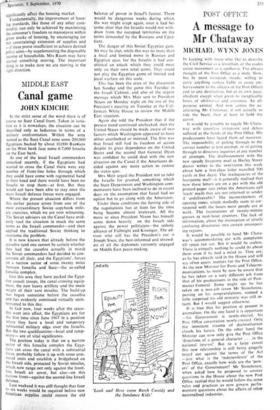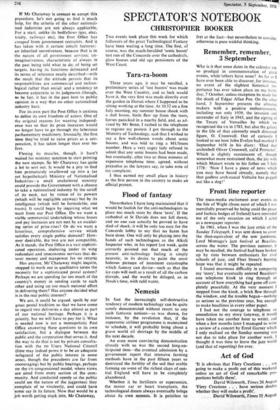POST OFFICE
A message to Mr Chataway
MICHAEL WYNN JONES
In keeping with those who like to describe the Civil Service as a leviathan, or the trades union movement as a carthorse. I've always
bthuotugbyht mofotshe t s iPaansdt aOrclasi"s teaasday;mwuliell.inSglowto,
carry anything (unless liable to cause em- barrassment to the officers of the Post Office) and to any destination, but at its own pace: obedient except %%lien given to inexplicable bouts of obstinancv and crassness. An all- purpose animal. And now comes the ac- celerating Mr Chataway, if not actually to ride the beast, then at least to hold the carrot.
It would be possible to regale Mr Chata- way with countless irritations and delays
suffered at the hands of the Post Office. His predecessors have heard them ad nauseant. The impossibility of getting through to the correct number at first attempt, or of getting through to directory inquiries at any number of attempts. The disillusionment with the new speedy fivepenny mail (a Harley Street doctor writes to the SPECTATOR this week about how a first-class letter travelled 500 yards in five days). The inadequacies of the fourpenny mall—is it generally realised that now these letters are on a par with the old printed-paper rate (what the Americans call 'trash' mail) they are not returned to sender if undeliverable? The inconveniences of opening times, which studiedly seem to cor- respond with the hours most people are at work. The frustrations of twenty-minute queues at rush-hour counters. The lack of information, about the insinuation of utterly confusing directories into certain unsuspect- ing regions. It would be possible to bend Mr Chata- wav's accommodating ear with complaints till space ran out. But it would be useless. There is virtually nothing he could do about them even if he had a mind to. They are, as he has already said in the House and will say often again, matters for the Post Office. As the new Minister for Posts and Telecom- munications, he must by now be aware that he has taken on a very different job from that of his predecessors in the role of Post- master-General. Some might say he has taken on a non-job (even Mr Stonehou.se, passing on his congratulations. seemed. a little surprised his old ministry was still in- tact). But I would suggest otherwise. It is true that his position at present is anomalous. On the one hand it is opportune —his Government is newly-elected, his Post Office corporation newly-created. Only the imminent trauma of decimalisation clouds his future. On the other hand the Minister can now only give the Post Office 'directions of a general character . .. in the national interest'. But to a large extent this new relationship is still being gingerly tested out against the terms of the Act —just what is the 'independence' of the Post Office, exactly how wide are the 'pow- ers' of the Government? Mr Stonehouse, when asked how he proposed to answer questions in the House about the new Post Office, replied that he would follow the same rules and practices as now govern parlia- mentary 'questions about the affairs of other nationalised industries.
If Mr Chataway is content to accept this procedure, he's not going to find it much help, for the criteria of the other nationalg ised industries are not always applicable. For a start, unlike its bedfellows (gas, elecl tricity, railways etc), the Post Office has escaped from government restraints. And it has taken with it certain inbuilt features: an inherited secretiveness, because that is in the nature of all government services; un- imaginativeness, characteristic of always in the past being told what to do, of being set targets, having its functions delineated and its terms of reference neatly described—with the result that the attitude persists that its responsibilities are commercial and techno- logical rather than social; and a tendency to become autocratic in its judgments (though, to be fair, it has in the past bent to public opinion in a way that no other nationalised industry has).
For its own part the Post Office is anxious to define its own freedom of action. One of the original reasons for wanting independ-, ence was so that its price increases would no longer have to go through the laborious parliamentary machinery. Ironically, the first time they've tried to raise prices as a cor-i potation, it has taken longer than ever be4 fore.
Flexing its muscles, though, it hasn't waited for ministry sanction to start printing the new stamps. So Mr Chataway has quite a lot to sort out. It would be a pity to find him prematurely swallowed up into a (as yet hypothetical) Ministry of Nationalised Industries—a small uncluttered ministry could provide the Government with a chance to take a nationalised industry by the scruff of its neck, not by virtue of its powers (which will be negligible anyway) but by its intelligence (which will be formidable, one trusts). It could begin by inquiring what we want from our Post Office. Do we want a viable commercial undertaking whose losses and pay increases are not met by an escalat- ing series of price-rises? Or do we want a luxurious, comprehensive service which satisfies every single public demand? How- ever desirable, the two are not compatible. As it stands, the Post Office is a vast sophisti- cated operation, sheltering under its wing redundant and uneconomic services that dad your money and manpower for no return.; Has anyone, MiChataway might inquire, stopped to work out in qualitative terms the necessity for a sophisticated postal system? Perhaps we are spending far too much of the country's money in sending cards to each other and using up too much national effort in delivering them? Has anyone decided what is in the real public interest?
We are, it could be argued, spoilt by our great postal tradition so that we have come to regard two deliveries a day almost as part of our national heritage. Perhaps it is a priority, but we will have to pay for it. What is needed now is not a monopolistic Post Office answering these questions to its own satisfaction, but a dialogue between the public and the corporation that serves it. And the way to do that is not by private consulta- tion with the PO Users National Council (time may indeed prove it to be an adequate safeguard of the public interest in some areas, though the precedents are far from encouraging) but by public hearings, perhaps on the us congressional model, where views are aired from every section of the Qom. munity. And conducted openly so the public could see the nature of the juggernaut they icomplain of so virulently, and could have some say in its future. Now that would be a job worth getting stuck into, Mr Chataway,































 Previous page
Previous page